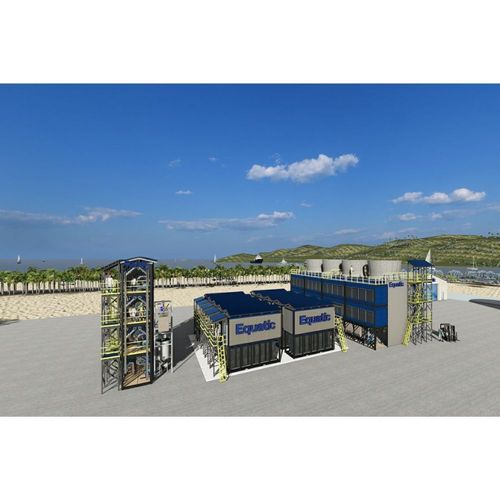UCLA and Equatic to build world’s largest ocean-based plant for carbon removal

Rendering of the ocean-based carbon dioxide–removal demonstration plant in Singapore. // PHOTO: Charles Grace
March 6, 2024
BY UCLA
Advertisement
Advertisement
Related Stories
Deep Sky Secures First-of-its-Kind Financing with Finalta Capital to Advance Carbon Removal in Canada
Deep Sky has secured an $11 million bespoke credit facility from Finalta Capital to finance its flagship Alpha carbon removal facility in Alberta. Alpha, the world’s first cross-technology carbon removal site, became North America’s first DAC project to sequester CO₂ underground.
Boral Successfully Trials Concrete with Recycled Concrete Aggregates Recarbonated via Carbon Capture from a Cement Plant – An Australian First
Boral has successfully trialed concrete made with recycled aggregates recarbonated via carbon capture technology from its Berrima cement plant. The pilot, supported by the federal CCUS Development Fund, replaced 50% of natural coarse aggregates with recarbonated recycled materials in a low-carbon mix.
Babcock’s LGE business has secured Approval in Principle from Lloyd’s Register for its ecoCPTR® onboard carbon capture system. The technology combines Aqualung’s facilitated transport membrane capture with Babcock’s ecoCO2® system, offering a compact, modular solution for both new and retrofitted vessels.
Capsol Technologies has been awarded a feasibility study for a European Bioenergy with Carbon Capture and Storage (BECCS) project. The biomass-fired combined heat-and-power plant under evaluation could remove more than 200,000 tonnes of CO₂ annually while supplying renewable heat to local communities.
PTTEP Moves Forward with Thailand’s First CCS Project at Arthit Field to Advance the National Net Zero Goal
PTTEP has reached a final investment decision on Thailand’s first carbon capture and storage project at the Arthit gas field. With operations expected to start in 2028, the project will capture and store up to 1 million tonnes of CO₂ annually while aligning with the nation’s Net Zero targets.





